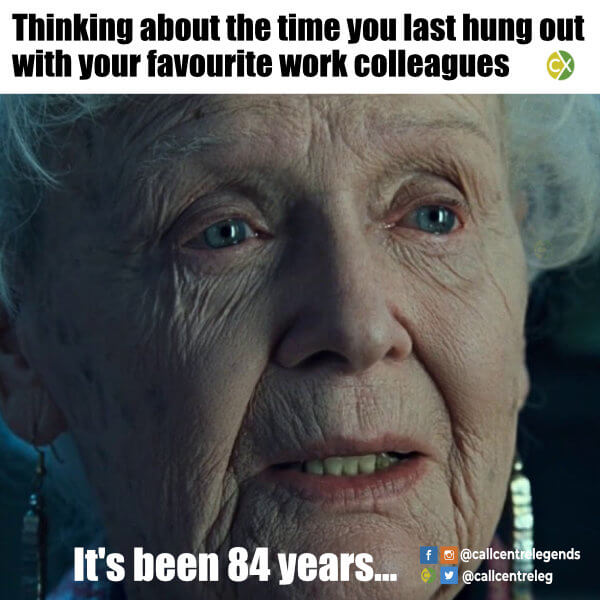
Working from Home post COVID – Negotiating the complex ‘new normal’ …. or not!
Working from home or remotely has been around for a while …. ‘Telecommuting’ was the buzz word a couple of years ago and uptake was gradually happening, enabled by cloud technology.
But in truth, working from home has both benefits and drawbacks.
This applies as much in an office environment as it does to a contact centre.
I was talking to a leader in a large contact centre this week who said 40% of his team hate working from home, 20% not really in favour and 40% love it.
That split pretty well equals everything I am reading about.
CX Central have published a number of articles around various aspects of both WFH and COVID response so we decided we would bring this together in a single document that hopefully will assist in your decision making (or at least provoking thought) as we gradually come out of enforced remote working to optional remote working.
Back in March, we published an article with Tips on How to Manage the Contact Centre during COVID19 and this article is aimed at providing advice and suggestions on how to manage things now and into the future.
5 Key Considerations to Working From Home post COVID
1. Technology
Working from home post COVID without being enabled by technology is like working with one hand tied behind your back (come to think of it some organisations had very old technology in their office location anyway so were already on shaky ground!).
Once lockdown was imminent there was a rush to adapt to technology that would work remotely – unfortunately I suspect many decisions were made in a rush and systems are being used that are not the best fit. For example:
-
Does your video conferencing need to be secure end to end?
-
Are all aspects of your system fully integrated to avoid having multiple systems and ensure they are more efficient?
-
Are your phone diversions just a redirection or can they provide connectivity?
-
Are you capturing WFP data on all calls or are they lost going ‘off-system’?
-
How can agents easily and quickly get the answers they need to complex customer enquiries?
-
Can you still listen in to or record calls and help coach an agent?
-
Is document and diary sharing simple and easy?
-
Are you using separate systems for webinar, video conferencing, teleconferencing, phone calls etc?
-
Are you reliant on IT in head office for systems or will they work anywhere?
I was on a call to a bank’s complaints department who apologised the call was not being recorded … in the hurry to move people to home working they did not have the technology.
The time to think about a technology upgrade is BEFORE you need it not after.
But of course, here we are.
So if you found yourself in the rush to get your agents working from home, now is the time to make sure you have the right system in place for both now and into the foreseeable future.
You’ll find a list of specialist suppliers of contact centre technology like cloud contact centre solutions, Knowledge Management tools, quality scorecards, gamification and more in the free CX Directory >
2. Culture
Organisations have their vision statement, induction training, staff development …. well, all things that develop your personal and team culture.
But from working in those close relationship circles, we are now sitting on the end of a phone or video talking to each other.
How many posts have you seen saying ‘can’t wait to get back into the office to see you guys’ or similar?
Yes, we had an article on that! https://cxcentral.com.au/
Remote conversations miss out on non-verbal communication, blockages to team building (the water cooler or over lunch chats), assimilating new team members.

To move from a close team environment to a remote one will cause hurdles over time so before making it permanent, think about how you are going to support your team in the new environment (different if you set it up from scratch as you can build in these items and the expectations are different).
Organisational culture can trump nearly every other shortfall a company has.
Its well documented that companies that provide exceptional cx are more profitable – and that comes from its people and culture.
We’ve got an article on how to build engagement for remote employees >
I am a firm believer in developing the right culture, values and mindset from day one.
The recruitment process should not only identify suitable candidates that fit your culture but also instil the desire for the new recruit to work for you.
And induction should embed that basic philosophy and enthuse. After all, if you can’t be enthusiastic when you start a job when can you be?
For me a mission statement is key.
Not one of those ‘half-page encompasses anything’ things you find on the intranet and nobody reads or knows.
No, a one-sentence ‘elevator pitch’ that comes to mind on every call and interaction.
A job description is what you do in your job, a mission statement is the lengths you will go to achieve your job – basically one is the minimum the other the maximum.
And this needs to be re-enforced. We all get in a rut and forget so ongoing training and a chance to re-ignite the enthusiasm.
Can that be done remotely?
Some yes, online learning and gamification, video conferencing and a heap of other initiatives (there was a great thread sharing ideas on this on our Facebook group recently).
Bringing the team into the office for training days, or making a mandatory amount of time to work in the office.
Workforce management will probably change in a WFH environment.
-
Are agents dealing with enquiries quicker because they are not interrupted?
-
Or longer because they are!
-
Is the wrap time longer because they need to research details rather than ask the office guru they usually sit next to?
-
Can agents shift roster times to fit volumes as they are not commuting?
It’s difficult to predict what changes are required but necessary to keep abreast of.
3. Workspace
Not everyone has a suitable workspace at home.
One family I know highlights this issue.
Both parents have executive jobs in a CBD and therefore the family home is in the central city location and thus a small 2-bedroom townhouse.
Two bedrooms – one for the 2 kids and one for parents, a small kitchen and a small living space which doubles for eating.
Hard enough for one parent to work from home in that small living area – especially if the kids are home, as they would have to go in their small bedroom.
But two? Impossible.
There would be many other examples of unsuitable conditions to work from home.
There is the health and safety aspect, liability, ergonomics.
There is the cost to set up the environment with desk, chair, reliable computer, a printer?
And you need a reliable internet connection – and in some areas, the NBN is a shambles or not even available yet!
I am sure you can add more …. working 7 or 8 hours at the kitchen table works for a week or two, but permanently?

4. Mental Health
Some people will love working on their own.
And figures show that people are generally more productive… but these are people who WANT to work remotely and therefore are more engaged.
And if you need some tips on how to manage engaged employees we’ve got an article with 10 Top Tips for Managing Remote Employees.
But some employees need support, need to be able to seek instant affirmation or work better in tandem.
I notice in my kids that they develop documents for work or college on their own then need to discuss and seek validation (even on subjects I know nothing about).
This, I am sure, is due to the way they were taught in school – work in teams and collaboratively.
We, therefore, need mechanisms to be able to identify and support those that struggle with working remotely, ensuring they are not cut off.
-
How to provide the right level of supervision.
-
How to be available.
-
If you work in a team what strategies have you to continue this, to ensure you are in unison?
-
How do you spot if someone is not coping well?
Read our article: The positive health effects of working from home >
5. Business Continuity Planning (BCP)
Does your organisation have an up to date Business Continuity Plan?
Over the years most of these have been about technology – having a stand by for a temporary situation.
COIVD re-writes that need into wider areas where we need to consider different drivers and longer-term solutions.
We covered some of these aspects in our earlier article but some headline tips include:
-
Have flexible technology that allows mobility and scalability.
-
Does this technology need extra training for employees? (not a good idea if you need to deploy at a moment’s notice)
-
Are employees able to work from home (see point 4 above!)
-
Are your supervisors skilled in delivering support and guidance remotely?
-
Have you identified key priority areas e.g. those that generate revenue or cash flow to keep the business viable?
-
Have you sufficient off-site and multi-centre data centres for redundancy?
-
Have you a system for updating employees on constantly changing information? i.e. a single source of truth or KMS?
-
Are your WFP processes easy in order to roster to meet any new demands?
-
And probably THE most important …. Are your current processes and policies built on sound foundations so they can withstand the changes? If your foundations are not sound then any alterations are built on shaky ground. You would be amazed at how many organisations have still not got the basic foundations in place.
Summary
I am sure there are other areas not covered above.
There are just so many aspects to working from home post COVID whether its migrating 100% to remote work or working a hybrid model.
And each individual and company is different with conflicting needs, wants, requirements.
There is a myriad of solutions … and we documented some of them in April and I’m sure you can add a few to this by now!
Hopefully, you have already considered the items mentioned.
If not, then this article (and the others linked) may prompt some deeper thought.
That then raises the question if you have the capacity (and in some cases capability) to address these internally.
I was talking to a bank (that complaint I mentioned earlier) about their process in rolling out a change of policy.
It was obviously not delivered well and resulted in thousands of complaints which is costing the bank more than the savings the change was meant to deliver.
The problem was they thought about the bank process, not the customers (what I call the inside out not the outside in) … demonstrating clearly their limited internal capability.
They had blinkered thinking, and even with that learning still have!!!
The method may have changed but the objective is still the same – customer should always come first.
We really are in uncertain times.
There is no right answer but there are lots of wrong ones.
I love reading about how each organisation and person I am connected to are coping.
If you need assistance then obviously, we are happy to add to your capacity or capability in any way we can and don’t forget to share your thoughts, ideas and earnings in the comments section to help others.
Finally, feel free to reach out to me personally or at CX Consult or search the list of consultants on the CX Directory >


Be the first to comment